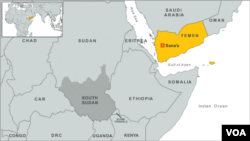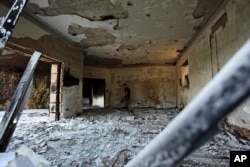CAIRO — A Yemeni man working on security issues with the U.S. Embassy in the capital Sanaa was killed Thursday in a drive-by shooting. Some analysts suspect al-Qaida was behind the attack.
The shooting took place in a residential neighborhood west of Sanaa as U.S. Embassy employee Qassem Aqlani was heading to work..
A witness to the shooting, Mansour al Hamadi, said he saw the attackers riding a motor-bike.
He said one of the gunmen called Aqlani by name as he was on his way to work and then shot him in the head with three bullets after catching his attention.
Arab satellite channels said Aqlani was involved in the investigation of a recent attack on the U.S. Embassy compound in Sanaa in which a mob broke through the gate and damaged embassy vehicles and other property.
That attack was part of a series against U.S. government offices in the Arab world starting on September 11. U.S. embassies or consulates in Egypt, Libya, Sudan, Tunisia and Yemen were stormed. Ambassador to Libya Christopher Stevens and three other Americans were killed during the attack on the U.S. consulate in Benghazi.
Hakim Almasmari, editor-in-chief of the Yemen Post, said that al-Qaida has been calling for attacks on the U.S. Embassy in Sanaa and its employees for months. He said the group is seeking revenge for a series of U.S. drone attacks in southern Yemen.
Almasmari said the killing of the man employed by the U.S. Embassy shows the hallmarks of al-Qaida, although the group has made no claim of responsibility yet.
"The attack was a motorcycle attack and all motorcycle attacks in the south over the last couple of months have been al-Qaida linked," said Almasmari. "This seems to be the easiest way to conduct the attacks. They're less costly and more efficient, because it takes little planning and little effort."
Yemen analyst Gregory Johnsen of Princeton University said that security in the Yemeni capital has deteriorated since protests that eventually ousted President Ali Abdullah Saleh began in February of 2011. He said it is still too early to attribute Thursday's killing to al-Qaida.
"It's just such an unsettled situation right now in Yemen that it's hard really to lay this at the feet of al-Qaida at this moment," he said. "Crime is on the rise because of what appears to be a weakening economy. There are a number of factions that are struggling for control of power and so it's a very murky and unsettled situation at the moment."
Yemeni security sources, however, blamed al-Qaida for a number of attacks on government targets, including the decapitation of three government soldiers Wednesday. Al-Qaida has killed a number of other Yemenis whom it has accused of spying for the government.
The shooting took place in a residential neighborhood west of Sanaa as U.S. Embassy employee Qassem Aqlani was heading to work..
A witness to the shooting, Mansour al Hamadi, said he saw the attackers riding a motor-bike.
He said one of the gunmen called Aqlani by name as he was on his way to work and then shot him in the head with three bullets after catching his attention.
Arab satellite channels said Aqlani was involved in the investigation of a recent attack on the U.S. Embassy compound in Sanaa in which a mob broke through the gate and damaged embassy vehicles and other property.
That attack was part of a series against U.S. government offices in the Arab world starting on September 11. U.S. embassies or consulates in Egypt, Libya, Sudan, Tunisia and Yemen were stormed. Ambassador to Libya Christopher Stevens and three other Americans were killed during the attack on the U.S. consulate in Benghazi.
Hakim Almasmari, editor-in-chief of the Yemen Post, said that al-Qaida has been calling for attacks on the U.S. Embassy in Sanaa and its employees for months. He said the group is seeking revenge for a series of U.S. drone attacks in southern Yemen.
Almasmari said the killing of the man employed by the U.S. Embassy shows the hallmarks of al-Qaida, although the group has made no claim of responsibility yet.
"The attack was a motorcycle attack and all motorcycle attacks in the south over the last couple of months have been al-Qaida linked," said Almasmari. "This seems to be the easiest way to conduct the attacks. They're less costly and more efficient, because it takes little planning and little effort."
Yemen analyst Gregory Johnsen of Princeton University said that security in the Yemeni capital has deteriorated since protests that eventually ousted President Ali Abdullah Saleh began in February of 2011. He said it is still too early to attribute Thursday's killing to al-Qaida.
"It's just such an unsettled situation right now in Yemen that it's hard really to lay this at the feet of al-Qaida at this moment," he said. "Crime is on the rise because of what appears to be a weakening economy. There are a number of factions that are struggling for control of power and so it's a very murky and unsettled situation at the moment."
Yemeni security sources, however, blamed al-Qaida for a number of attacks on government targets, including the decapitation of three government soldiers Wednesday. Al-Qaida has killed a number of other Yemenis whom it has accused of spying for the government.







